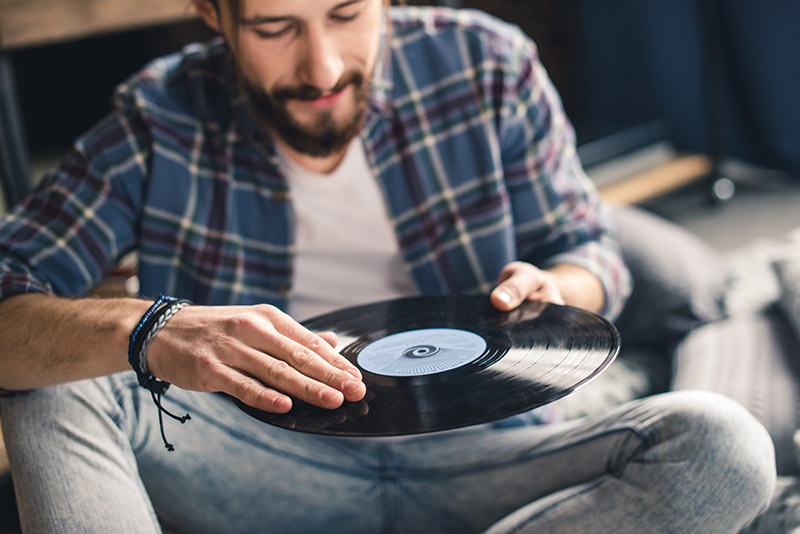Cleaning Vinyl Records With Vinegar: Does It Work?
This page may contain affiliate links. If you make a purchase through one of our affiliate links, we’ll earn a commission, at no extra cost to you. For more details, please read our disclosure.

Despite the vast developments in music technology and digital playback in recent years, lots of people still opt to listen to their favorite music on vinyl. There is an authenticity and experiential element to manually playing a record and hearing the signature crackle as the stylus hits the vinyl.
To maintain and protect your favorite vinyl records there are tasks you need to do, such as cleaning them. Causing some people to wonder if cleaning vinyl records with vinegar is safe and does it actually work?
As a vinyl record owner, you’ll probably know how important it is to take good care of your collection to avoid any damage. They require high levels of care and must be stored, cleaned, and handled appropriately if they are to keep their quality and value.
Vinyl records are made of a material called polyvinyl chloride, or PVC. They can become easily scratched or damaged and should only be handled at the outer edges to avoid reducing the sound quality of the record.
As well as incorrect handling and scratching, dirt and dust particles on the surface of the vinyl can also be detrimental to the sound quality. Because of this, it is necessary to clean the vinyl record regularly, while still taking extreme care not to cause any lasting damage.
So, how do you go about this? It’s about finding the balance between cleaning thoroughly while being extremely gentle and taking care not to scratch or mark the surface of the record. There are lots of tools and products you could use to clean your vinyl records and different people prefer different methods.
Here, we are going to keep it super simple and explain to you how and why regular household vinegar should be used to clean your vinyl records. We’re going to look at cleaning vinyl records with vinegar, what makes it such an effective cleaning agent, and will also give a quick rundown of some products or tools you should definitely avoid when it comes to cleaning your vinyl records!
We will start by looking at how vinegar can be used to effectively remove dirt and dust particles from your vinyl records.
Related: How to Clean White Shoelaces Without Bleach
How to Clean Vinyl Records with Vinegar
The first thing to do when cleaning your vinyl records with vinegar is to choose the right type of vinegar for this purpose. The best option here is white vinegar.
Before going in with the vinegar, take a clean microfiber cloth and wipe over the surface of the vinyl to remove any dirt particles that could scratch the surface of the record. Use minimal pressure here to avoid damage.
- High-quality microfiber
- Affordable
- Clean with just water
Our favorite microfiber cloths for use around the home are the general purpose clothes from E-Cloth. Whether you're wiping down the kitchen table, countertops, or scrubbing just about any other surface in your house, these clothes are effective, durable, and affordable. Over the course of a year, you'll save a huge amount of money on paper towels and cleaning solutions, plus you can keep the chemicals out of your home.
Mix equal parts white vinegar and distilled water in a clean spray bottle. Spray the mixture over the surface of the vinyl and allow it to sit for a few minutes.
Then, take a clean, dry microfiber cloth or sponge and remove the vinegar mixture from the vinyl. A good quality cloth or sponge will also remove any dust or dirt particles and the vinegar should have loosened any tough grease. This will leave you with shiny clean vinyl, giving optimal sound quality and extending the life of the record.
Why Vinegar?
White vinegar has natural antibacterial properties and is made up of 5% acetic acid and 95% water, making it a safe and effective cleaning agent. It’s also great at breaking down grease and grime.
It is completely non-toxic and chemical-free, reducing the risk of any damage to the surface of the vinyl record and also making it much safer to use within your home.
White vinegar is an effective cleaning ingredient but is also gentle enough not to cause any damage to the record.
Products or Ingredients to Avoid When Cleaning Vinyl Records
Avoid any harsh chemicals or ingredients such as rubbing alcohol. Other products like Windex and regular dish detergents also should not be used when cleaning vinyl records. These contain harsh chemical compounds that will strip the record of its shiny surface. This means the record is more likely to become scratched by the stylus on your record player or through regular handling.
Related: The Best Non-Toxic Dish Soap
Any brushes or harsh materials should also be kept away from your vinyl records for obvious reasons. Only soft, clean cloths or sponges should be used to avoid unnecessary scratching.
Finally, opt for distilled water over regular tap water if possible. Tap water contains mineral deposits that can cling to the vinyl and affect the sound quality. In some areas, tap water can also contain high amounts of limescale, which can be detrimental to the vinyl quality.
Final Thoughts on Using Vinegar to Clean Vinyl Records
Caring for and maintaining the quality of your vinyl records may seem like a laborious and complicated task, but anyone who appreciates the sound quality and overall experience of choosing, playing, and listening to vinyl records knows that it is totally worth it.
As detailed in this article, cleaning vinyl records does not have to be complicated or expensive. Some good old-fashioned white vinegar and a gentle cloth will do the trick just fine.

